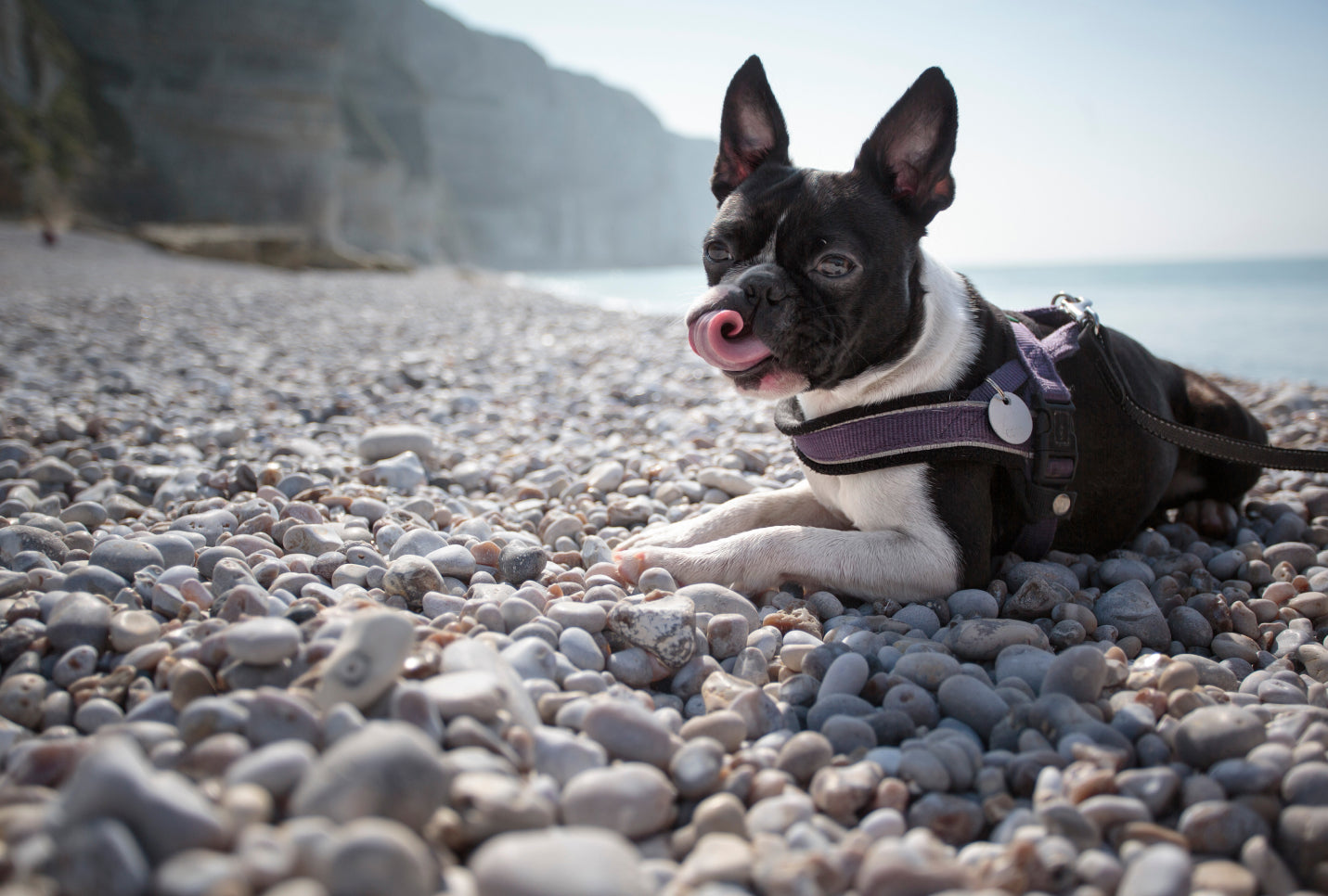
Why Do Dogs Eat Rocks?
Ah, dogs. They're known as man's best friend, and for good reason — their loyalty, playfulness, and boundless energy make them the perfect companions for humans. But like any other living creature, dogs have their quirks. One particularly strange behavior is their love of eating rocks.
Yes, you read that correctly. Some dogs will eat rocks, leading many pet owners to scratch their heads in confusion. You might wonder, "Why on earth would they do that?" Well, fret not!
In this article, we'll explore the surprising reasons behind this peculiar canine habit and offer advice on handling it.
Why Does My Dog Eat Rocks?
Dogs are natural scavengers, and their curiosity can lead them to explore and chew on various objects, including rocks. But why do they feel the need to eat them?
Let's explore some possible explanations:
Boredom Busters
Dogs, especially those with high energy levels, are always looking for ways to entertain themselves. When left without proper mental and physical stimulation, they may resort to unconventional behaviors — like rock-eating — to alleviate boredom.
Nutritional Deficiencies
Another possible reason why dogs eat rocks is due to a nutrient deficiency. Dogs who are lacking in certain vitamins or minerals may be drawn to objects that contain those nutrients.
For example, some rocks contain trace amounts of iron, which dogs may crave if they have an iron deficiency. If you suspect that your pooch is eating rocks due to a nutrient deficiency, consider swapping their kibble for premium food like A Pup Above.
Made with 100% human-grade ingredients and absolutely nothing artificial, our vet-approved fresh dog food recipes are packed with essential vitamins and minerals to help your pup stay happy, healthy, and nourished.
Teething Troubles
Just like human babies, puppies go through a teething process. As their adult teeth come in, they may be tempted to chew on objects — including rocks — to soothe the discomfort of swollen gums.
Fortunately, teething is only a temporary phase, and puppies will usually outgrow it by the time they're six to eight months old.
Pica
Some dogs have a condition called pica, which involves an abnormal craving for non-food items. Rocks can be one of the objects they find appealing.
Pica can stem from various factors, including anxiety, stress, or underlying medical conditions. Identifying and addressing the root cause is crucial to curbing this behavior.
Attention-Seeking
Dogs are clever animals and quickly learn which behaviors attract our attention. If they notice that eating rocks grabs our immediate concern and intervention, they may continue doing it to gain our focus and interaction.
Natural Instincts
Believe it or not, the inclination to chew on rocks may have ancestral roots. In the wild, canines may have gnawed on rocks to keep their teeth clean, sharpen them, or even aid in the digestion of bones and other prey.
Anxiety and Stress
Eating rocks may also be a sign of anxiety or stress. Rocks are solid and durable, so dogs may find comfort in chewing on them when they feel overwhelmed or scared.
Why Is It Bad for Dogs To Eat Rocks?
While a dog's rock-eating behavior may seem perplexing, it's crucial to understand the potential dangers associated with this habit. Consuming rocks can pose serious health risks for our furry friends.
Here are some reasons why eating rocks can be harmful to dogs:
Choking and Blockages
Rocks can vary in size, and if a dog swallows a large or jagged rock, it can become lodged in their throat or digestive tract, leading to choking or blockages. This can be a life-threatening situation that requires immediate veterinary intervention.
Dental Damage
Gnawing on rocks can cause significant dental problems. Dogs may fracture their teeth or wear down their enamel, leading to pain, discomfort, and the need for dental procedures.
Gastrointestinal Injuries
The sharp edges of rocks can cause lacerations or tears in the delicate tissues of the gastrointestinal tract. This can result in internal bleeding, infection, and severe abdominal pain.
Toxicity Risks
Some rocks may contain harmful substances or be contaminated with toxins. If a dog ingests a toxic rock, such as one previously sprayed with pesticides, it can lead to poisoning and have detrimental effects on their overall health.
Digestive Upset
Even if a dog manages to pass a rock without obstruction, it can still cause irritation and inflammation in the digestive system. This can lead to scary symptoms such as vomiting, diarrhea, abdominal discomfort, and loss of appetite.
How Do I Stop My Dog from Eating Rocks?
If your pup has a penchant for rock-eating, there are steps you can take to discourage the behavior. Here are some useful tips and tricks to keep in mind:
Supervise and Redirect
Keep a close watchful eye on your dog when they are outdoors or in environments with access to rocks. If you catch them approaching a rock with the intention to eat it, redirect their attention to a more appropriate chew toy or engage them in a game of fetch.
Reward them with praise and treats — or a handful of their favorite dog food — when they choose the desired object instead of rocks.
Increase Mental and Physical Stimulation
Since boredom and lack of mental and physical stimulation can contribute to destructive behaviors like rock-eating, it's important to ensure your dog gets enough exercise to release pent-up energy.
Engage them in interactive games, provide puzzle toys, and go for regular walks to keep their mind stimulated and their body active.
Train the "Leave It" Command
Teach your pup the "leave it" command, which can be invaluable in preventing them from picking up and ingesting rocks. Start by offering them a treat in a closed hand and saying, "Leave it."
When they stop trying to get the treat, reward them with a different treat and praise. Repeat this training exercise regularly, gradually progressing to using objects that resemble rocks until they can reliably respond to the command.
Use Bitter Spray or Deterrents
Dogs often dislike the taste of bitter substances. Consider using a pet-safe bitter spray or deterrent specifically designed to discourage chewing behaviors.
Apply the spray on rocks or other objects your dog may be tempted to eat. The unpleasant taste will discourage them from approaching and consuming rocks.
Soothe Anxiety
If your pup is snacking on rocks as a way of confronting anxiety or stress, it's important to look for ways to calm and comfort them. Talk to your vet about possible solutions — such as medications or supplements — that may help reduce their anxious behavior.
You could also try aromatherapy, playing calming music, or providing them with a cozy spot to relax and feel safe.
Create a Safe and Stimulating Environment
Ensure your dog's environment is free from rocks or other objects they might be tempted to eat. Regularly inspect your yard or the areas where your dog spends time, and remove any potential hazards.
Provide plenty of chew toys, bones, and interactive puzzles to keep them engaged and satisfied.
Practice Positive Reinforcement
Positive reinforcement training can be highly effective in redirecting your dog's behavior. Whenever you see your dog showing no interest in rocks or choosing an appropriate alternative, praise and reward them with treats or verbal affirmations.
Positive reinforcement helps reinforce the desired behavior and encourages your dog to repeat it.
Leash Training and Close Monitoring
If your dog has a habit of seeking out and eating rocks during walks or outings, keep them on a leash and closely monitor their behavior. This allows you to intervene quickly and redirect their attention whenever they attempt to pick up rocks.
Gradually, with consistent training and monitoring, your dog will learn to ignore rocks and focus on more appropriate activities.
Consult a Vet
If your dog's rock-eating behavior persists despite your best efforts, it's crucial to seek advice from a veterinarian. They can assess your dog's health and provide further guidance or recommend any necessary tests to rule out underlying medical conditions.
A Final Word
While the phenomenon of dogs eating rocks may puzzle us at times, it's important to approach it with a mix of curiosity and concern for our four-legged friends. By understanding the reasons behind this questionable behavior and taking proactive steps to address it, we can keep our dogs happy, healthy, and rock-free.
So, the next time you catch Fido eyeing a pebble with a cheeky look in their eyes, remember to redirect their attention, provide plenty of mental and physical stimulation, and always keep an eye out for any potential hazards. You've got this!
Here at A Pup Above, we understand how important a healthy and happy pup is for pet parents. That's why we curated our human-grade dog food with only the best of the best ingredients. Whether you have a rock eater or not, you can trust that A Pup Above will always provide your best furry friend with the nutrition they deserve.
Sources:
Why Do Dogs Eat Rocks? | American Kennel Club
Pesticide Poisoning in Pets | National Pesticide Information
"Leave It": Training Your Dog To Ignore Food & Other Items On Command | American Kennel Club
Top Stories

Why Do Dogs Lick Their Paws?

Why Do Dogs Whimper & Make Noises in Their Sleep?

Healthy Vet-Approved Homemade Dog Food Recipes

How To Cook Sweet Potatoes for Dogs






















